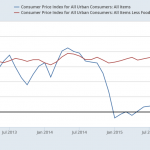After refusing to even consider the possibility of a recession in the US for over a year, the first cracks in Goldman Sachs’ armor are starting to appear. Over the weekend chief equity strategist David Kostin said that while the probability of a recession remains low according to GS economists, saying that “their model suggests the US has an 18% probability of recession during the next year and 24% likelihood during the next two years”, Goldman’s clients and investors “continue to inquire about the impact a contraction would have on the US equity market.”
Displeased with this inquiry into the worst case scenario, one which nobody at Goldman predicted as recently as a few months ago, Kostin is forced to present Goldman’s sensitivity “of our existing earnings and valuation forecasts to a US recession scenario.” Here is Goldman’s take of what may be the worst case scenario for stocks in a recession:
We estimate the S&P 500 index will generate $117 in EPS in 2016, a rise of 11% from last year, although EPS growth excluding the Energy sector will equal just 5%. Our baseline earnings forecast assumes the US economy expands by an average of 2.0% in 2016 while world ex-US growth averages 3.6%. We forecast sales, margins, and earnings for each sector of the S&P 500 based on assumptions for US GDP growth, global GDP growth, inflation, interest rates, crude oil, and the US Dollar.
From a sensitivity perspective, we estimate a 100 bp shift in US GDP growth will affect our S&P 500 EPS forecast by roughly $5 per share. For example, holding other macro variables constant, if US GDP growth averages +1.0% then EPS would equal approximately $111.
And here the humor begins:
However, if the US falls into recession and GDP actually declines by 1.0% (300 bp below our baseline forecast) then EPS would equal just $100 per share, a decline of 6% from last year and a 13% drop from the recent EPS peak of $115 in 2014. Coincidentally, the median peak-to-trough fall in EPS around the 13 recessions over the past 80 years equals 12%. Most investors find the sensitivity of our EPS forecast to shifts in GDP growth much smaller than they expect.












Leave A Comment